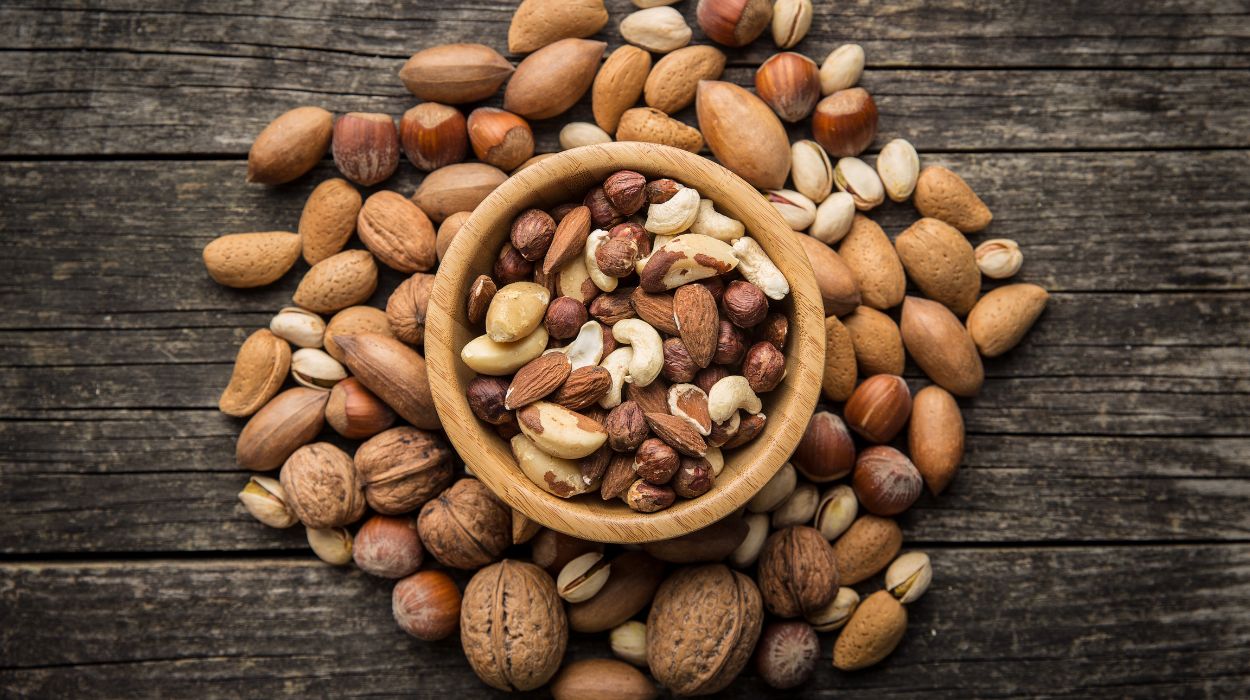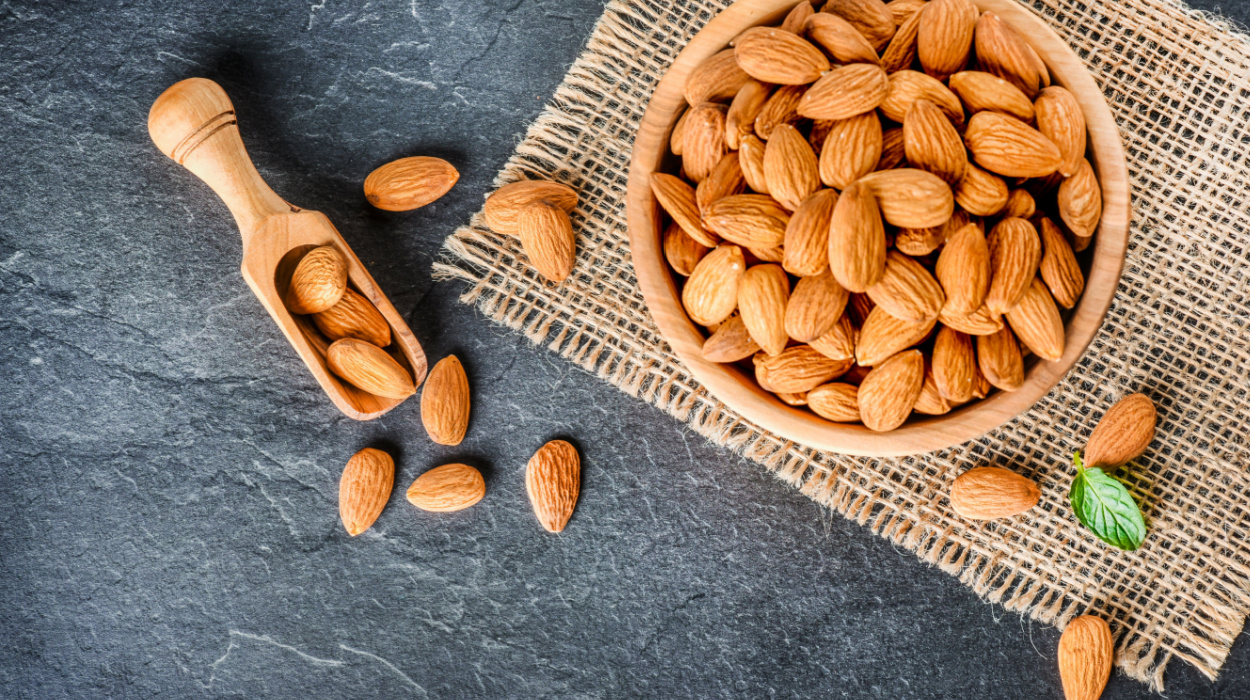Did you know most nuts are classified as fruit or edible fruit seeds?[1] Peanuts are the exception – they are considered legumes and grow in the ground. Some commonly consumed tree nuts include almonds, walnuts, and cashews.
Nuts are nourishing foods containing nutrients like fiber, protein, healthy fats, vitamins, and minerals.
People mistakenly associate eating nuts with being unhealthy or causing weight gain. However, research indicates nuts eaten in moderation along with a healthy diet promote several health benefits.[2]
Nut consumption is associated with a decreased risk of cardiovascular disease and positively affects cholesterol. Research indicates consuming nuts also has positive effects on weight loss.[3] What are the effects, and which ones are the best nuts for weight loss?
Let us dive into the current evidence-based information and find the answers.
Best Nuts To Eat For Weight Loss
A few of the best nuts for weight loss include:
- Almonds.
- Walnuts.
- Peanuts.
Snacks are a great way to add nuts to your diet, and eating nuts before a meal can also satisfy hunger.
Best Nuts For Weight Loss
Numerous studies demonstrate nut consumption has a positive effect on weight control.[3] But while they are nutrient-dense, nuts are calorie-dense as well. Because of this, portion control is necessary when nuts are part of a weight-loss diet.
When nuts replace less healthy food such as red meat or refined grain products, evidence suggests they may decrease obesity[3] and obesity-related chronic conditions. Studies show nut consumption is associated with lower body mass index, BMI, and waist circumference.[4]
Let us highlight a few of the most beneficial nuts for weight loss – almonds, walnuts, and peanuts.
Almonds

Almonds are one of the most researched foods. Compared to other nuts, a serving of almonds contains the highest amount[5] of fiber, protein, and heart-healthy mono and polyunsaturated fats.
They also are highest in beneficial plant compounds called plant sterols, as well as vitamin E and other vitamins.
Recent systematic reviews and meta-analyses showed almonds were the only nut that led to a small but significant decrease in body mass[5] and fat mass. A 2023 systematic review and meta-analysis noted that almond-enriched diets significantly improved cholesterol and triglycerides and reduced inflammatory biomarkers.
The same study reported higher almond consumption[3] of more than 42.5 grams per day significantly improved fasting blood sugar and reduced BMI.
In a six-week study using healthy but overweight people, one group consumed 42.5 grams of almonds and the other an equivalent calorie amount of a snack. The results for the almond group were a significant reduction[4] of abdominal fat mass, leg fat mass, and waist circumference.
Multiple studies indicate almond consumption suppresses hunger[6] and the desire to eat after eating them, leading to decreased caloric intake later at mealtime.
Walnuts
Like almonds, walnuts contain essential nutrients, offer health benefits, and may support weight loss. Walnuts contain higher amounts of polyunsaturated fat than other nuts. Higher quantities of these unsaturated fatty acids are associated with greater fat oxidation[4] or fat burning.
Research indicates walnuts can support weight loss[7] when part of a low-calorie diet. Notable results of the study above include reduced body weight, body mass index, and waist circumference. Other randomized controlled trials showed that walnut-rich diets significantly reduced body fat percentage.[3]
Walnuts are also associated with decreased cardiovascular disease risk[8] due to their effects on lowering systolic blood pressure and LDL cholesterol, the “bad cholesterol. Consuming walnuts may benefit cognitive health, possibly due to anti-inflammatory qualities.
Peanuts
Peanuts contain about 50% monounsaturated fat,[9] which is associated with lower LDL cholesterol and heart health. They are in the legume or bean family and have more protein than tree nuts.
Research showed that high oleic peanut[10] consumption specifically suppressed hunger three hours after eating. The study recorded higher diet-induced thermogenesis or fat burning than with conventional peanuts.
A randomized controlled trial was done where participants consumed whole peanuts[11] as part of a low-calorie diet. This was done for eight weeks. The entire peanut group showed a significant reduction in BMI as well as lower body weight, waist circumference, and total body fat. These results occurred while total lean mass, i.e., muscle, was maintained.
Why Are Nuts Good For Weight Loss?

Nuts contain nutrients and bioactive compounds[4] that support weight loss. Their plant protein and dietary fiber promote satiety and a sense of fullness. Nuts contain mostly unsaturated fatty acids, which help burn fat.
The fiber in nuts[6] slows gastric emptying, which affects appetite hormones in the gut. This process positively affects gut health and creates a feeling of satisfaction.
These appetite-suppressing effects may be due to the effects of nut fiber[4] on the gut microbiome. The fiber promotes bacterial growth, affecting hunger hormones and decreasing appetite and satiety.
Health Benefits Associated With Consuming Nuts
Experts report that the bioactive compounds and high unsaturated fat[12] content in nuts are why they are beneficial to health. Because tree nuts and peanuts demonstrate health benefits, experts recommend regularly consuming 30 grams per day,[13] or 1 ounce of nuts.
Supports Healthy Blood Sugar
Tree nuts and peanuts are considered low-glycemic[14] foods, which means they tend to raise blood sugar more slowly and have a more favorable effect on blood glucose levels. Therefore, eating more low-glycemic foods like nuts can support the management of diabetes and help regulate blood sugar[14] after consumption.
May Lower Bad Cholesterol Levels
Nuts have a positive effect on cholesterol[2] by lowering LDL cholesterol levels, which may decrease the risk of heart disease. Nuts contain phytochemicals[1] and healthy plant chemicals that have anti-inflammatory and protective effects on the body’s cardiovascular and nervous systems.
May Benefit Thyroid Health
The selenium[15] content in nuts may benefit thyroid health. Recent studies demonstrate that consuming nuts as part of a nutrient-dense diet also benefits men’s sexual health.[16]
Additionally, there is ample evidence that other nuts, including pistachios, Brazil nuts, hazelnuts,[15] macadamias, and cashews, also offer nutritional benefits.
How To Use Nuts For Healthy Meals
There are many options to include nuts in your diet. Adding nuts as a snack before meals, in particular, may help reduce hunger. Watch portion sizes because too many nuts add extra calories, which may derail your weight loss efforts.
The list below offers some ideas for using nuts to improve overall health.
- Top off warm dishes like Thai food with peanuts or pine nuts on pasta.
- Mix nuts into your granola.
- Add nuts to yogurt.
- Make a healthy breakfast by adding nuts to oatmeal.
- Add nut butter to smoothies.
- Toss some nuts on your salad.
Best Time To Eat Nuts For Weight Loss
The timing of when you eat nuts is important in terms of how they affect your appetite. Consuming nuts before a meal seems to decrease hunger[6] and caloric intake during the meal. Evidence shows eating nuts as a snack[6] versus part of the meal provided greater satiety.
Important Lifestyle Factors For Weight Loss
Weight loss requires a multifaceted approach and consistency. Try not to focus on how long it takes to lose weight but on the process of becoming healthier while you tackle your weight loss goals.
A healthy, low-calorie diet is a significant factor in a weight loss plan. As discussed, nuts add health benefits and support weight loss as part of a balanced diet. In addition to including nuts, here are some additional factors to help promote weight loss.
- Ensure you eat the recommended essential daily nutrients – dietary fiber, protein, complex carbohydrates, and healthy fats.
- Eat in a calorie deficit.
- Plan for and perform regular physical activity, including cardio and resistance training.
- Get adequate sleep.
- Drink plenty of water.
- Manage your stress levels.
- Consider nutritional supplements or diet pills for appetite suppression, fat-burning, and a metabolism boost.
Conclusion
According to experts, more research on nuts and weight loss is needed. Regardless, many studies support eating nuts as part of a low-calorie diet benefits weight loss and management. Nuts’ nutritional components aid appetite control and the body’s fat-burning process.
Nuts are nutrient and calorie-dense; therefore, replacing unhealthy calories with a serving of nuts is one swap you can make to support weight loss. In addition, eating nuts did not appear to promote weight gain in several studies.
Nuts contain essential nutrients for weight management and overall health. For the biggest benefits, consume a variety of your favorite nuts.
Frequently Asked Questions
It is okay to eat nuts when trying to lose weight. Evidence shows nuts do not promote weight gain when consumed in moderation as part of a healthy, low-calorie diet.
The recommended amount of nuts is approximately 30 grams or 1 ounce daily. However, there may be slight variations depending on the type of nut.
No, it is completely okay to eat nuts daily if you choose, as long as you stay within the recommended 30-gram daily serving amount.
While all nuts offer health benefits when eaten in the suggested serving size, some are higher in unhealthy saturated fats than others. Brazil nuts, in particular, have the highest saturated fat percentage compared to other nuts and should thus be consumed in moderation.
No research points to limiting certain nuts to benefit men’s health. In fact, many studies support that a healthy, nutrient-dense diet, including nuts, benefits men’s sexual health.[16]
 Evidence Based
Evidence Based
